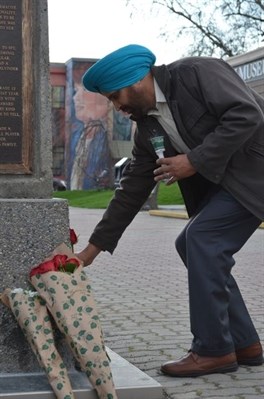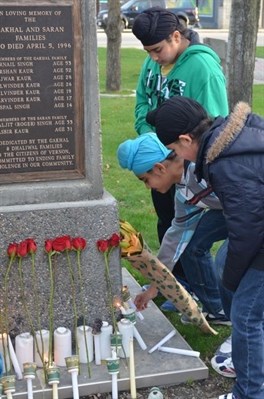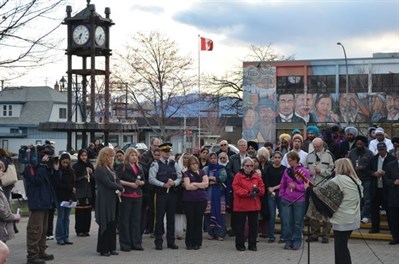
(CHARLOTTE HELSTON / iNFOnews.ca)
April 08, 2013 - 11:51 AM
By Charlotte Helston
Last month's murder-suicide in rural BX hit close to home for a Vernon family that experienced a similar tragedy 17 years ago.
A vigil for the victims of Canada's second largest mass murder was held Friday evening outside the museum. The community huddled together, shielding candles from the sharp breeze. Colourful saris flickered out from beneath black coats as female relatives placed roses on a commemorative marker anchored the heart of the city.
Raminder Gakhal, now 29, was just 12-years-old when Mark Chahal walked into a Vernon home and shot his estranged wife Rajwar Gakhal, and eight of her relatives as they were preparing for a wedding.
"Rajwar was my cousin," Gakhal says. Domestic violence drove her cousin away from Chahal, an abusive man wed to her in an arranged marriage.
"Back with her family, she started living again, and just as she did, (Chahal) came back and took it all away," Gakhal says. "He left a dark legacy in the community."
An echo of that darkness shocked the community just a month ago when a man shot his wife, then himself, leaving behind two orphaned children.
"No case is the same, I don't know what the situation was, but this hit very close to home," Gakhal says. "You think, 17 years later, and we are still experiencing the devastating effects of domestic violence. It's so sad when a small community experiences something so big."
Brooke McLardy of the Vernon Women's Transition House says the area has around one such incident a year.
Gakhal says things need to change. "B.C. is lagging, typically only taking action after high-profile cases."
A 2011 report from Simon Fraser University noted high statistics for women murdered in domestic disputes between 2003-2008, and suggested the province design an all-encompassing framework to combat violence. A good model, the report said, would highlight prevention and better connect the services already available for victims.
A year before the SFU report came out, Vernon established a program trying to do just that. It's called the Integrated Case Assessment Team (ICAT) and it networks between the RCMP and local agencies to help connect people with the services they need.
"Without the sharing of information between agencies, things were falling through the cracks," Debbie Hamilton, with the Women's Transition House, says.
Sgt. Robb Daly was part of ICAT from day one, and says it's the second big change in domestic violence policing he's witnessed in his career. The first was the Gakhal mass murder. He remembers life as a cop in the years before 1996. In those times, if he was called to a report of domestic violence, he'd lock the abuser up overnight, and usually, that would be it.
"(The abuser) could just go back and repeat the whole thing the next night. It wasn't good prevention," Daly says.
Response to the Gakhal murders started to change that. Domestic violence units began expanding services to victims. But for Vernon, that was just the beginning.
"Domestic violence is such a slippery slope," Daly says. "There are so many social aspects to it, it's not just about culture or poverty. Police just can't do this stuff all on their own."
With ICAT, various organizations work together to tackle those issues and emphasize prevention. That includes services to assist the abuser, not just the victim, because people like Daly know it's not just about locking up the offender.
"It's about stopping the cycle, and assisting abusers is a big part of that," Daly says.
Gakhal is pleased to see programs like ICAT working towards a safer place for families, but she says there are still challenges.
"There's still a cultural stigma that makes it hard for women to come forward, or to even talk about it. We need to make domestic violence a taboo," she says.
To contact the reporter for this story, email Charlotte Helston at chelston@infotelnews.ca or call (250)309-5230.

Raminder Gakhal would like to see more young people attend the vigil in coming years.
(CHARLOTTE HELSTON / iNFOnews.ca)

(CHARLOTTE HELSTON / iNFOnews.ca)
News from © iNFOnews, 2013